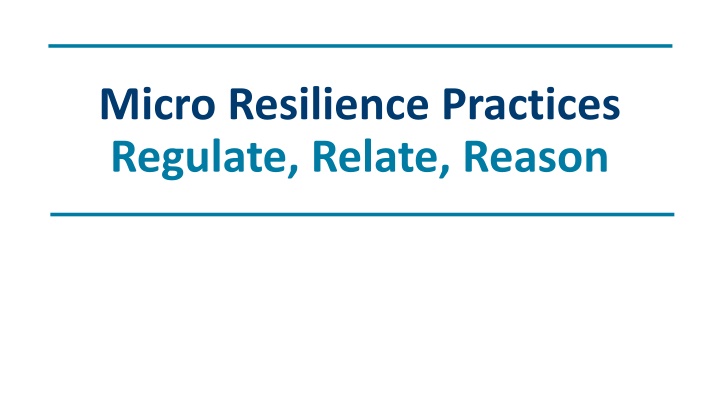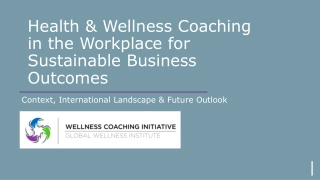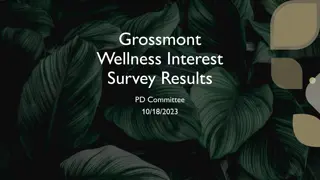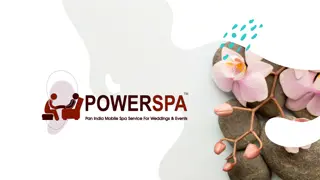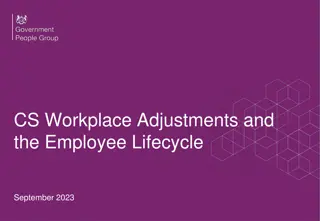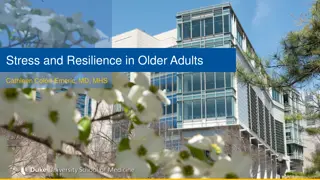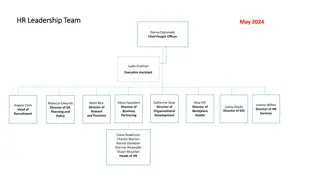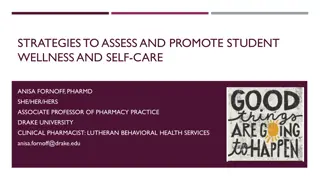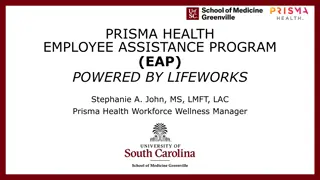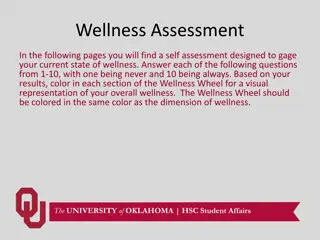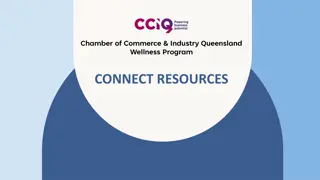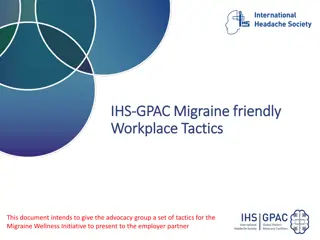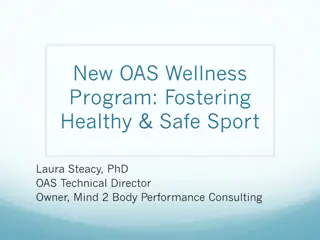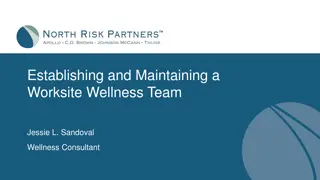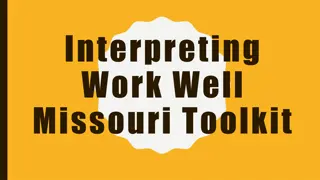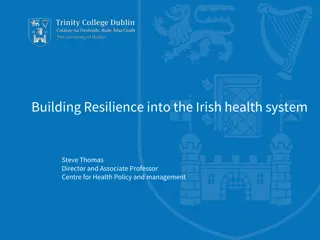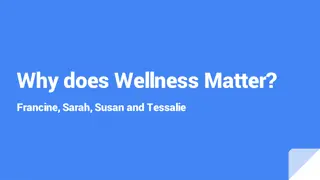Workplace Resilience: Strategies for Employee Wellness and Team Success
Explore micro resilience practices such as regulation, relating, and reasoning to enhance well-being and foster a positive workplace environment. Learn effective techniques for regulating emotions, building psychological safety, and supporting colleague communication. Discover ways to create a safe space for voicing concerns, practicing mindfulness, and promoting teamwork for overall employee wellness and team success.
Download Presentation

Please find below an Image/Link to download the presentation.
The content on the website is provided AS IS for your information and personal use only. It may not be sold, licensed, or shared on other websites without obtaining consent from the author.If you encounter any issues during the download, it is possible that the publisher has removed the file from their server.
You are allowed to download the files provided on this website for personal or commercial use, subject to the condition that they are used lawfully. All files are the property of their respective owners.
The content on the website is provided AS IS for your information and personal use only. It may not be sold, licensed, or shared on other websites without obtaining consent from the author.
E N D
Presentation Transcript
Micro Resilience Practices Regulate, Relate, Reason
Three Ways to Regulate: Bottom up somatosensory, meditation, rhythmic physical activity Top down use our brain With other people
Index of Regulation Practices for Workplace Meetings Music Grounding/Breathing Hand Breathing 5-4-3-2-1 Humor "Take yourself to safety" visualization Team building exercises Shouts outs and acknowledgements Debrief challenging incidents Practice building psychological safety Practice deep listening
Grounding and Breathing This Photo by Unknown Author is licensed under CC BY-NC
Breathing and Observing 101 Link: Happify https://www.youtube.com/watch?v=o-kMJBWk9E0
5 4 3 2 1 Method Link: The Partnership In Educationhttps://www.youtube.com/watch?v=30VMIEmA114
SUPPORTING EMPLOYEE WELLNESS: MINI-MINDFULNESS Use the STOP method for redirecting back to the present moment. S= Stop what you re doing right now. T= Take a few deep breaths. Allow your body to take the breath it needs in its natural rhythm of being alive. O= Observe your body and notice if there s any tension or tightness anywhere. Observe what s going on in your mind and if you re feeling distracted or settled in the present moment. Observing means to just be aware of our experience in this moment: physically, emotionally, and mentally. P = Proceed means just thinking about the questions What s most important for me to pay attention to right now? or What am I needing right now?
What is psychological safety? The belief that one will not be punished or humiliated for speaking up with ideas, questions, concerns or mistakes . A 2016 Google study found that the most important factor for successful teams is psychological safety.
Build Safe Space for Colleagues to Voice Silent Problems Make Implicit Explicit: Ask people to list problems that are being avoided Regulate Yourself: No interruptions rule and No Blame or Shame Acknowledge Your Role: What are we all doing that perpetuates this problem? What do you control and what do you not control? What can you start and stop doing?
Aligning with Values AND Deep Listening Practice Partner A speaks first for 1-2 min, answering one of these questions: What values lead you to do this work? What are you worried about? Partner Blistens silently, noting Partner A s nonverbal indicators: body, tone, movement, facial expression, etc. Partner B provides a 30 second reflection: I heard that you are worried about X, really heard your voice change, your body slump, etc. Swap roles Discuss the experience If time: Repeat exercise with question: What are you grateful for?
SUPPORTING EMPLOYEE WELLNESS We will inherently feel stressed: o naming and coping with that stress will make you, the people you care about, and your community stronger. Practical suggestions o Check-in and connect with others o Remember what s within your control vs. outside of it o Create a schedule/routine and stick to it o Identify your self-care non- negotiables o Don t watch the news or talk to others about stressors before bed
Take Yourself to Safety: Visualize a Safe Place Lead through a script or show Underwater Video: https://www.youtube.com/watch?v=CwRvM2TfYbs
Somatic Resources to De-Escalate & Re-Enter Window of Tolerance Hand on heart, hand on belly Give yourself a hug Wrap yourself in a blanket In a seated position with feet flat on the floor, cross arms, and place each palm on inside of opposite knee Stand on your own two feet grounding Hold a soft pillow Build a boundary around you (bathtub, bathroom, pillow fort) Push against a wall
Resources to Build More Resiliency Practices Within the Clinic Deep breathing & grounding practice Sharing stories of client and employee successes during meetings Music and/or art in the waiting areas Encouraging 5 min walks/breaks throughout the day Holding collaborative debriefs following stressful incidents Starting meetings with self-affirmations
Regulating with Others: Ice Breakers What word describes your state of being right now? What do you need to do to be able to be present for this meeting? What is the best human interaction you had this week? What do you need to take care of yourself this weekend? Anything anyone in here can do to help?
Regulating with Others: Team Building Shout Outs and Notes of Gratitude Ball Throwing All Team, Learn Names Circle All Team Countdown Exercise Thinking, Seeing, Feeling Exercise in groups of 3 Strings direct communication all group If I had One Million Dollars Team Building Games by Herman Otten You Tube Channel: https://www.youtube.com/channel/UCtvhnnNkENAuo270Z-n2MFw Book: https://www.amazon.com/dp/B08CMYCDJY?geniuslink=true
Regulating with Others: Humor YouTube: Tiger Productions, Animal Humor https://www.youtube.com/watch?v=0HrbvMv4kQ0
Professional Quality of Life Scale (PROQOL) COMPASSION SATISFACTION AND COMPASSION FATIGUE (PROQOL) VERSION 5 (2009) 1. Take 5 min to start the self-care assessment and make a plan to take the PROQOL this week. 2. Identify 1 thing you will commit to doing next week. 3. Identify one way that a colleague can help you. 4. Group or partner share. Self Care Assessments: https://socialwork.buffalo.edu/content/dam/socialwork/home/self-care-kit/self-care-assessment.pdf https://compassionresiliencetoolkit.org//media/PC_Section1_SelfCompassionScale.pdf
Do One New Healing Practice this Week Identify 1 thing you will commit to doing this week Identify one way that someone in this room can help you
